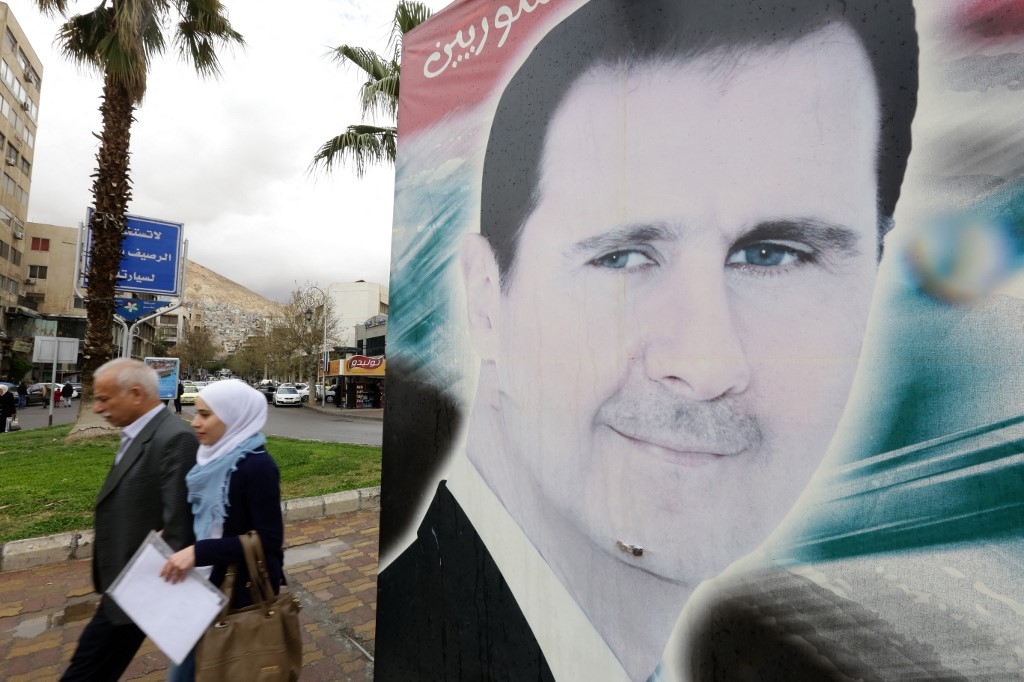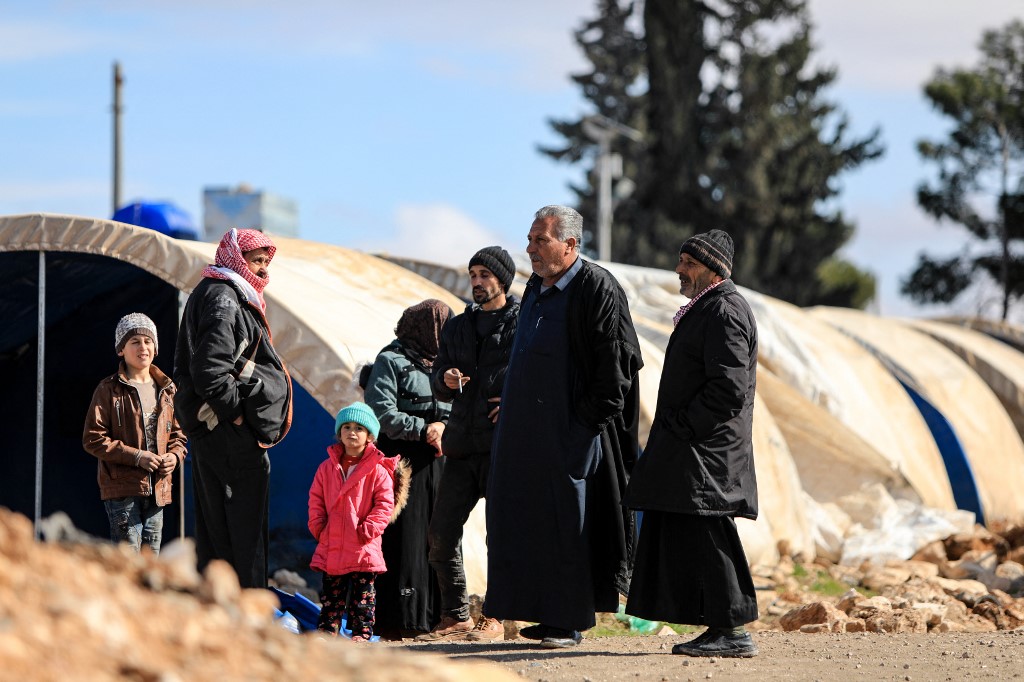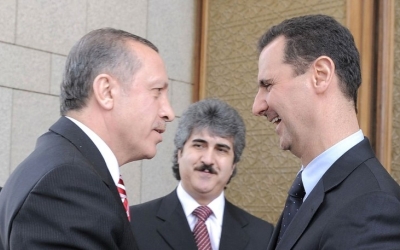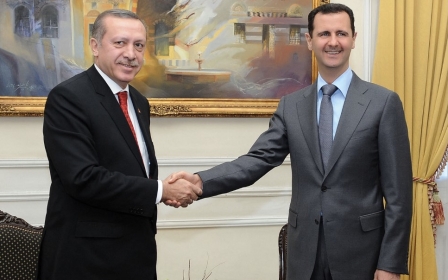Turkey-Syria: The myth of reconciliation with Assad

After recent comments by Turkish Foreign Minister Mevlut Cavusoglu about a possible reconciliation between Ankara and Damascus, many have been speculating on this topic. Yet, while no diplomatic breakthrough should be expected anytime soon, the alleged benefits for Turkey do not withstand a reality check.
Turkish President Recep Tayyip Erdogan made an important statement last week that Turkey is not aiming for regime change, but is focused on fighting terrorism in Syria. Cavusoglu has since said that Ankara is ready to talk with Damascus, without any preconditions.
For Turks, the YPG is a top priority in Syria; for the Assad regime, the priority is the Turkish-backed Syrian opposition
These statements serve two main goals: to respond to Russian pressure, and to address domestic political considerations. The Turkish opposition has argued that reconciliation with the Assad regime would facilitate the return of refugees to Syria, and that the Turkish government’s stubbornness is the only obstacle. The Turkish electorate seems to be buying this argument.
Those in Ankara who support the notion of reconciling with the Assad regime believe it would facilitate the return of Syrian refugees and aid in the fight against the Kurdish People’s Protection Units (YPG). They are hopeful that Russia would genuinely support the rapprochement, as Moscow focuses on Ukraine and aims to avoid getting bogged down in Syria.
But the first reminder of the realities in Syria came from the country’s foreign minister, Faisal Mekdad, who this week accused Turkey of supporting terrorism, and demanded the full withdrawal of Turkish forces from Syria and the end of aid to the Syrian opposition.
New MEE newsletter: Jerusalem Dispatch
Sign up to get the latest insights and analysis on Israel-Palestine, alongside Turkey Unpacked and other MEE newsletters
Grim outlook
For close watchers of the Syrian conflict, these remarks were entirely predictable. The Assad regime has previously called Turkey “one of the main sponsors of terror” over its support for the Syrian opposition.
Expectations among the Turkish public and advocates for reconciliation need to go through a reality check. Indeed, the outlook for reconciliation between Ankara and Damascus is grim; but for the sake of argument, if it did happen, would these expectations be met?
When it comes to the return of Syrian refugees, interestingly, advocates for reconciliation appear to have ignored the experiences of Lebanon and Jordan, which have both normalised relations with Damascus. Yet, since 2019, only around 40,000 Syrians have returned from Lebanon to Syria, while thousands more refugees have entered Jordan. The Jordanian government now faces a drug smuggling problem, as the Assad government has become a massive captagon producer.
In Turkey, the chances of a return to regime-held Syria seem even more unlikely amid regular military clashes near the Turkish border. In contrast, the regions near Lebanon and Jordan are fully under the control of the Assad regime.
Furthermore, many Syrian refugees in Turkey do not want to live under the Assad regime, fearing their fate if they return. If they were sent back forcefully, they may try their luck fleeing to Europe. For the Assad regime, these Syrians are not welcome; it views them as collaborators and terrorists, and its forces have subjected returnees to detention, disappearance and torture, including sexual violence.
Additionally, the regime cannot provide for millions more Syrians, knowing that their presence in the country may lead to another uprising. Why would the Assad regime take such a risk?
Existential threat
It also remains to be seen what will happen to the population inside Syria in opposition-held areas, including internally displaced people from across the country who refused to live under the Assad regime and were taken in symbolic green buses towards the Turkish border. As the Assad government wants Turkey to withdraw from Syria, a Damascus-Ankara reconciliation comes with a realistic chance of millions more Syrians fleeing to Turkey.
Expectations on potential cooperation in Turkey’s fight against the YPG also contradict realities in Syria. The Assad regime signed an agreement with the YPG in 2019 to protect YPG-held areas from Turkey and its allied forces. Since then, the regime has deployed its forces alongside the Russian military in Tal Rifaat, Manbij, Kobane and other cities.
With Turkey recently threatening another military operation in Syria, the YPG has vowed to coordinate with the Assad regime to defend the area. Earlier this month, the Turkish air force struck border posts near the Kurdish-held town of Kobane, killing 17 fighters, including three Syrian regime soldiers.
From the perspective of the Assad regime, the Syrian opposition is an existential threat, while the YPG is a local problem that can be resolved by integrating its forces into the Syrian Arab Army and giving some local governance rights to Syrian Kurds. For Turks, the YPG is a top priority in Syria; for the Assad regime, the priority is the Turkish-backed Syrian opposition.
Finally, the assumption that Russia has a genuine interest in finding a political solution in Syria amid the Ukraine war is a misperception. Knowing Russian strategy and misinformation campaigns, Moscow likely wants to buy time and prevent another Turkish-Syrian military operation while it is busy with Ukraine.
Russia knows that it would face a logistical nightmare if military escalation were to occur in Syria, after Turkey closed the Bosphorus and Dardanelles straits and its airspace to Russian planes flying to Syria. Moscow likely wants to stall Turkey until the costs of the war in Ukraine decrease. To trust Russia, which repeatedly claimed it had no intention of invading Ukraine, would be a foolish endeavour.
The views expressed in this article belong to the author and do not necessarily reflect the editorial policy of Middle East Eye.
Middle East Eye delivers independent and unrivalled coverage and analysis of the Middle East, North Africa and beyond. To learn more about republishing this content and the associated fees, please fill out this form. More about MEE can be found here.







